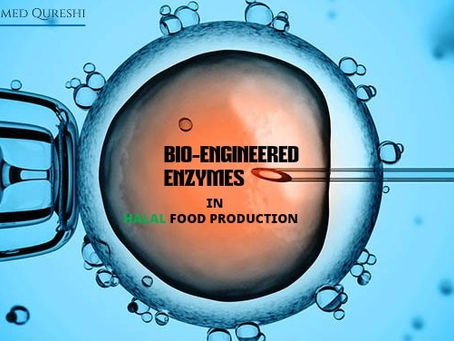Fish and seafood refer to all non-plant life from natural bodies of water, including rivers, lakes, ponds, seas, and oceans, as well as human-made fish farms. There are a number of differing opinions on the Halal or Haram status of fish and seafood. The Quran states:
To hunt and to eat the fish of the sea is made lawful for you, a provision for you and for seafarers; but to hunt on land is forbidden you so long as ye are on the pilgrimage. Be mindful of your duty to Allah, unto Whom ye will be gathered.
Chapter V, Verse 96
And He it is Who hath constrained the sea to be of service that ye eat fresh meat from thence, and bring forth from thence ornaments which ye wear. And thou seest the ships ploughing it that ye (mankind) may seek of His bounty, and that haply ye may give thanks.
Chapter XVI, Verse 14
And two seas are not alike; this, fresh, sweet, good to drink, this (other) bitter, salt. And from them both ye eat fresh meat and derive the ornament that ye wear. And thou seest the ship cleaving them with its prow that ye may seek of His bounty, and that haply ye may give thanks.
Chapter XXXV, Verse 12
These verses state that it is lawful to fish for food. In fact, God has subjected the seas to human beings so they may partake of their bounty and benefit by what has been provided. In addition, a number of ahadith (traditions of Muhammad) also address the subject of seafood.
It is stated in a tradition of Prophet Muhammad S.A.W. that a group of his companions ran out of food on a journey and came upon a huge sea creature, often referred to as a huge fish (or whale), washed up on the shore. They debated whether it was permissible to eat from it because it was already dead, but finally decided that their need for food exempted them should there be any sin in it. After returning home and informing Muhammad, they were told it was a blessing provided to them by God. Three points of jurisprudence have been established here:
It is somehow permissible to eat huge fish (or whale) even though it is not considered a true fish because it is a mammal. Similarly, animals that wholly live in water (not water and land) are permitted for food.
There is no requirement to slaughter sea animals similar to land animals, even if they are mammals. They do have to be killed humanely, generally by leaving them out of the water to let them die their natural death, with a condition it isn’t consider under the category of Al – Samk Al – Taafi.
Unlike land animals, it is permitted to eat dead sea animals. However, they must not show signs of deterioration and spoilage.
Islamic scholars have studied this question of which seafood is permitted and which is prohibited to be eaten by Muslims. Some of the scholars believe that only live catches are Halal. They believe that if the object is found dead, it comes under the restriction of prohibiting the consumption of dead land animals. The majority of scholars opine that seafood is exempt from this restriction, and use the tradition about the dead whale to justify their opinion.
As to the species of sea creature that are permitted, all scholars have agreed that fish with scales are Halal. Some believe that only fish with scales are Halal and other creatures are not. This group believes that lobster, shrimp, octopus, eels, etc., are not permitted. Some have opined that anything that can only live in water is Halal, whereas creatures that can live in and out of the water are Haram. The latter include turtles, frogs, and alligators.
From this discussion, it seems that fish and seafood can be divided into four categories, with some categories universally accepted as halal, whereas others accepted by some Scholars and not by others.
Category One — includes fish with scales and fins such as cod, flounder, haddock, halibut, herring, mackerel, perch, pollock, salmon, sea bass, whiting, buffalo fish, carp, trout, tuna, orange roughy, and snapper. This category is acceptable by all the Muslim consumers.
Category Two — includes fish or fish-like animals which may have fins but not removable scales. Some of these may breathe oxygen from air rather than water, but live in water all the time. Examples are catfish, shark, swordfish, eel, monk-fish, cusk, and blow-fish. This category is acceptable to the majority of Muslim consumers, but not all denominations accept them as Halal. They might consider them Makrooh (disliked or detested).
Category Three — comprises several unrelated species, mobile or not, of various shapes and sizes, that cannot survive without being in water. These are generally either molluscs or crustaceans, including clams, mussels, lobsters, shrimp, oysters, octopus, scallops, and squid. This group also includes marine mammals that live totally in the sea such as whales and dolphins. The majority of Muslim consumers eat them; however, others consider them either Haram or Makrooh. Shrimp seems to be in a special category: some only eat them but not the rest of category, considering it in the category of Insects.
Category Four — includes many of the animals generally falling under the definition of seafood. They live in and around water most of their life cycle, but are capable of living outside water because they can breathe air. These are generally not considered halal although some Islamic scholars are of the opinion that they are from the seas because they live in and around water. These include crabs, snails, turtles, alligators, and frogs.
Fish or any animals from the water are not required to be killed in any religiously specified manner as practised for land animals. However, fish and seafood should be prepared in a manner that the animals do not suffer excessively. They should not be skinned or scaled while still alive, for example, as practised by some Eastern countries.




